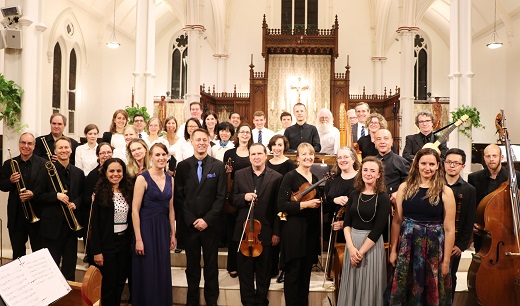By: Professor Michael O’Connor

It’s one the best ways to work out. It’s a way to meet your friends and make new ones. It fosters intellectual acuity and mental health. And there are no known side effects. At St. Mike’s, there are numerous opportunities to stretch your vocal muscles in song. The Schola Cantorum is one of them, our auditioned choir drawn from all parts of our community: undergraduate and graduate students, faculty and staff, alumni/ae, parishioners of St. Basil’s, friends and family.
The Schola sings three concerts per year in St. Basil’s Church: at Michaelmas, in Advent (at the end of the first semester) and in Lent (at the end of the second semester). The Michaelmas concert this year was “Mexican Baroque.” The centrepiece was the Polychoral Mass in D by Ignazio Stella da Gerusalemme (1707–69), an Italian who spent most of his career in Mexico City, working both at the Opera and at the Cathedral. The exuberant Mass setting—in newly-edited scores provided by Prof. Craig Russell—was complemented by plainsong chants for the feast of St. Michael.
Joining the choir were strings and winds of the Musicians in Ordinary Orchestra—including trumpets, a bassoon, and a continuo section of chamber organ, guitar, and harp. The closing piece, the anonymous “El Dìa del Corpus,” conveyed the infectious joy of an outdoor Eucharistic procession breaking into irrepressible dancing. We were honoured by the presence in the audience of representatives from the Mexican Consulate in Toronto as well as a large contingent from the “Global Reformations” conference that St. Mike’s co-sponsored with the Centre for Reformation and Renaissance Studies.
The Advent concert, “Begotten of Light,” was a mixed program of seasonal music drawing on over a thousand years of song, ranging from anonymous medieval chant to a motet by contemporary Scottish composer James MacMillan—by way of Victoria, Tallis, St. Hildegard, and the folk and devotional traditions of Europe and the Americas. Although most of the program was sung unaccompanied, the voices were joined on a couple of pieces by Jolie Chrisman on oboe and Celtic Studies’ own Éilis Keegan on fiddle.
On the eve of Palm Sunday and the threshold of Holy Week, our Lenten concert consisted of a single piece, Jesu Membra Nostri, by Danish-German composer Dieterich Buxtehude. The piece, whose full title is “The most holy limbs of our suffering Jesus, praised with the full devotion of the heart,” was composed around 1680, perhaps for a series of devotional evening concerts held in the Marienkirche in Lübeck, where Buxtehude was director of music. The young Johann Sebastian Bach walked more than 400 kilometres to Lübeck, and stayed nearly three months—to hear these concerts, to meet and listen to the great organist and composer, and “to comprehend one thing and another about his art.”
Bach’s fascination is an indication of the esteem in which Buxtehude was held by his peers. The piece sets verses from a mediaeval poem once attributed to St. Bernard of Clairvaux (1090–1153) but now credited to Arnulf of Louvain (c. 1200–1250)—like Bernard, a Cistercian monk. In Peter Holman’s words, “the author’s perspective is that of a penitent kneeling at the foot of the cross and gradually extending his gaze upwards, meditating on each part of the body in turn”: feet, knees, hands, pierced side, breast, heart, and face. (A later adaptation of lines from the last section of the poem became the well-known Passion hymn, “O sacred head, sore-wounded.”) The whole piece is a striking conjunction of mediaeval Cistercian and Lutheran baroque sensibilities, as text and music together conjure an emotionally intense encounter full of tenderness, heartache, awe, intimacy, thanksgiving, and ultimately joy. This was a most apt way to enter into the mood of Holy Week.
Each concert was attended by appreciative audiences and the free-will offerings raised over $4000 dollars for Mexican earthquake relief, needy families in Toronto, and Rohingya Refugees.
Although our formal season is over, we are involved in one more concert. As invited guests of the Corktown Chamber Orchestra, we’ll be singing the finale (the “Ode to Joy”) in their performance of Beethoven’s spectacular Ninth Symphony. The concert takes place at 8:00 p.m. on May 17, at Little Trinity Anglican Church (King and Parliament, near the Distillery District). All are welcome.
Professor Michael O’Connor, Christianity and Culture, is the director of the USMC Schola Cantorum.
